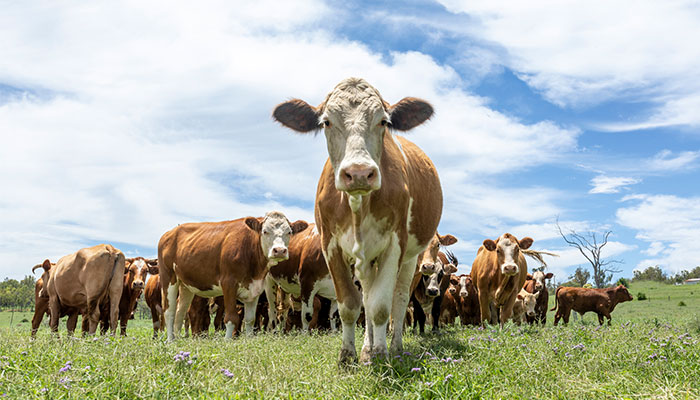Most plant-based beef produces more than 90 per cent less greenhouse emissions than the real deal, but the results are mixed when it comes to nutritional value, a new study has found.

With beef in the firing line over concerns ranging from greenhouse emissions and deforestation to heart disease, and questions of food security become more pressing, an increasing number of plant-based meat substitutes are being developed.
Industry and consumers are looking for quality information on the advantages and disadvantages of both products, but with most of the research being done overseas and in response to industry questions, Macquarie University researchers have found there are important gaps in what we know.
The multidisciplinary research team conducted a scoping study of the current scientific knowledge relating to the sustainability and nutritional quality of beef and plant-based beef. The research was funded by an alternative protein manufacturer, which had no input in the research process, seeking to make sense of the claims and counterclaims surrounding these foods.
Plant-based beef usually generates more than 90 per cent less emissions than animal-based beef, and requires much less land to produce …
They reviewed 33 papers from around the world that compared the sustainability of beef with plant‑based beef, and 13 papers that compared their nutritional quality. have been published in the latest edition of Journal of Cleaner Production.
Human geographer Professor Andrew McGregor says the literature shows plant-based beef performs dramatically better than the animal version in all metrics relating to climate change and land use.

“Plant-based beef usually generates more than 90 per cent less emissions than animal-based beef, and requires much less land to produce, which in turn has benefits in terms of biodiversity protection and deforestation,” Professor McGregor says.
“Most of the emissions associated with beef come from the methane emitted through cattle burps. Transporting the animals and refrigerating the meat contribute a relatively small percentage of the total, which surprises a lot of people.
“You have to take into account the emissions, land and water associated with producing cattle, which includes the feed the animals eat – and they need to eat a lot compared to a human because their rate of conversion is so poor.
“Even taking into account factors like plastic packaging and food miles for overseas-produced products, plant-based beef was significantly more sustainable.”
Not all burgers are created equal
Public health researcher, Associate Professor Seema Mihrshahi, says the results relating to the nutritional benefits of plant-based beef were mixed.
“Plant-based beef is lower in energy and fat, including bad fats and cholesterol, and higher in carbohydrates and fibre, but it is higher in salt and lower in protein, iron and zinc than beef,” says Associate Professor Mihrshahi.
“Plant-based beef products are also classified as ultra-processed foods because they contain flavours and colours and require a lot of processing to make them look and taste like meat.”
Associate Professor Mihrshahi says if compared to a meat-based burger from a fast-food chain, a plant-based burger would easily win in the nutrition stakes.

Broad scope: Professor Andrew McGregor (pictured left) and Associate Professor Seema Mihrshahi (pictured right) studied 46 research papers from around the world to come up with their new results.
However, if the fast-food burger were replaced with a lean beef burger, the victor would be less clear.
“Ultimately, plant-based beef patties are a good ‘gateway burger’ for someone moving towards a plant-based diet, or for a who wants to reduce their intake of red meat, because they are similar in texture and taste to a beef burger,” Associate Professor Mihrshahi says.
“But if you’re cooking at home, it would be healthier to make a burger with grilled mushrooms or other vegetables than to use plant-based beef.
“Very few adults are eating the amount of vegetables recommended by the Australian Dietary Guidelines.”
Location, location, location
The research team was also looking for studies on the environmental impacts of beef production in Australia, but they found relatively few.
Research requires funding, so Professor McGregor says it makes sense that people only pay to answer questions in which they have an interest. For this reason, most sustainability and nutritional research is funded by either the meat or plant-based protein industries, or in response to the requirements of one of those industries.
Professor McGregor says while the question of who is paying will always be extremely important, all the research they reviewed for their study was of a high standard.
“The real problem comes down to the research which is not funded,” he says.
“For example, when most of the research is coming from the United States or Europe, it’s easy to say those findings don’t apply in Australia because our land use and production methods are different.
“But from the literature, it was clear that even taking into those differences, plant-based beef is superior in terms of emissions and land use.
“At the end of the day, cattle create methane, and they all need feed of some sort, making them significant drivers of climate change and land use change.
“If people are to make informed choices about what they eat, there needs to be more independent research done in this area which answers a broader range of questions, including issues like jobs, working conditions, animal welfare and biodiversity loss, not just the questions that individual companies or industry bodies want answers to.”
is a human geographer in the Department of Social Sciences at Macquarie University
is a public health researcher in the Department of Health Sciences at Macquarie University






